Politics
Japan’s government in flux after election gives no party majority
Published
5 months agoon
By
Ekwutos Blog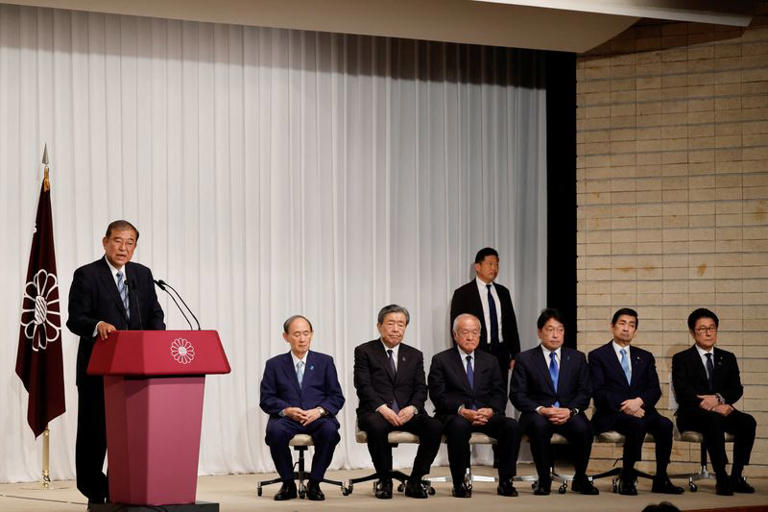
By John Geddie, Tim Kelly and Sakura Murakami
TOKYO (Reuters) -The make-up of Japan’s future government was in flux on Monday after voters punished Prime Minister Shigeru Ishiba’s scandal-tainted ruling coalition in a weekend election, leaving no party with a clear mandate to lead the world’s fourth-largest economy.
The uncertainty sent the yen currency to a three-month low as analysts prepared for days, or possibly weeks, of political wrangling to form a government and potentially a change of leader.
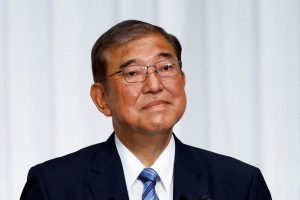
Japanese Prime Minister and leader of the ruling Liberal Democratic Party (LDP) Shigeru Ishiba arrives for a press conference a day after Japan’s lower house election, at the party’s headquarters in Tokyo, Japan October 28, 2024. REUTERS/Kim Kyung-Hoon/Pool © Thomson Reuters
That comes as the country faces economic headwinds, a tense security situation fuelled by an assertive China and nuclear-armed North Korea, and a week before U.S. voters head to the polls in another unpredictable election.
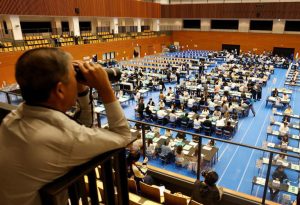
Election officers count ballots for the general election at a ballot counting centre in Tokyo, Japan October 27, 2024. REUTERS/Manami Yamada
© Thomson Reuters
“We cannot allow not even a moment of stagnation as we face very difficult situations both in our security and economic environments,” a defiant Ishiba said at a news conference held Tuesday, pledging to continue as premier.
Ishiba’s Liberal Democratic Party (LDP) and its junior coalition partner Komeito took 215 seats in the lower house of parliament, down from 279 seats, as voters punished the incumbents over a funding scandal and a cost-of-living crunch. Two cabinet ministers and Komeito’s leader, Keiichi Ishii, lost their seats.
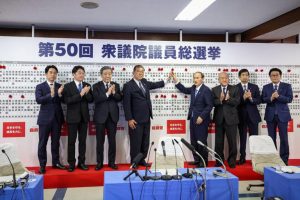
Japan’s Prime Minister Shigeru Ishiba poses for a photo with other members of the Liberal Democratic Party at the LDP’s headquarters on October 27, 2024, in Tokyo, Japan. Takashi Aoyama/Pool via REUTERS
© Thomson Reuters
The biggest winner of the night, the main opposition Constitutional Democratic Party of Japan (CDPJ), had 148 seats, up from 98 previously, but also still well short of the 233 majority.
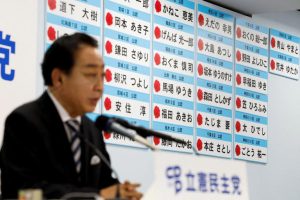
Yoshihiko Noda, leader of the main opposition Constitutional Democratic Party of Japan (CDPJ) speaks to the members of the media, in front of a board with names of CDPJ party candidates indicating results of the general election, at the party’s headquarters in Tokyo, Japan October 27, 2024. REUTERS/Kim Kyung-Hoon
© Thomson Reuters
As mandated by the constitution, the parties now have 30 days to figure out a grouping that can govern, and there remains uncertainty over how long Ishiba – who became premier less than a month ago – can survive after the drubbing. Smaller parties also made gains and their role in negotiations could prove key.
“It seems unlikely that he (Ishiba) will survive to lead a new government as prime minister … though it is possible he could stay on as caretaker,” said Tobias Harris, founder of Japan Foresight, a political risk advisory firm.
CDPJ leader Yoshihiko Noda has said he would work with other parties to try and oust the incumbents, though analysts see this as a more remote possibility.
The LDP has ruled Japan for almost all of its post-war history and the result marked its worst election since it briefly lost power in 2009 to a precursor of the CDPJ.
SCANDAL-TAINTED
Ishiba, picked in a close-fought race to lead the LDP late last month, called the snap poll a year before it was due in an effort to secure a public mandate.
His initial ratings suggested he may be able to capitalise on his personal popularity, but like his predecessor Fumio Kishida he was undone by resentment over his handling of a scandal involving unrecorded donations to LDP lawmakers.
Ishiba’s LDP declined to endorse several scandal-tainted candidates in the election. But days before the vote, a newspaper affiliated with the Japan Communist Party reported that the party had provided campaign funds to branches headed by non-endorsed candidates.
The story was picked up widely by Japanese media despite Ishiba saying the money could not be used by non-endorsed candidates. “LDP’s payments to branches show utter lack of care for public image,” ran an editorial in the influential Asahi newspaper two days before the election.
Support from smaller parties, such as the Democratic Party for the People (DPP) or the Japan Innovation Party (JIP), who won 28 and 38 seats respectively, could now be key for the LDP.
DPP chief Yuichiro Tamaki and JIP leader Nobuyuki Baba have both said they would rule out joining the coalition but are open to ad hoc cooperation on certain issues.
Ishiba echoed that sentiment, saying “at this moment in time, we are not anticipating a coalition” with other opposition parties. The LDP would hold discussions with other parties and possibly take on some of their policy ideas, he added.
The DPP and JIP propose policies that could be challenging for the LDP and the Bank of Japan.
The DPP calls for halving Japan’s 10% sales tax until real wages rise, a policy not endorsed by the LDP, while both parties have criticised the BOJ’s efforts to raise interest rates and wean Japan off decades of monetary stimulus.
“It’s up to what can they give to these two parties to try and get them to just kind of join their side. The best scenario is getting them into the coalition government, but that’s a tall order,” said Rintaro Nishimura, an associate at consultancy The Asia Group.
In a statement, the head of Japan’s most powerful business lobby Keidanren, Masakazu Tokura, said he hoped for a stable government centred on the LDP-Komeito coalition to steer an economy that faced urgent tasks such as boosting energy security and maintaining the momentum for wage hikes.
In one bright spot, a record 73 women were elected into Japan’s male-dominated parliament, surpassing 54 at the 2009 election.
(Reporting by John Geddie, Tim Kelly, Sakura Murakami, Chang Ran-Kim; Writing by John Geddie; Editing by Stephen Coates)
You may like


Champions League quarter-final: Arsenal thrash Real Madrid as Inter beat Bayern


US tariffs won’t have much effect on Nigeria – FG


Wike hosts suspended Rivers lawmakers in UK
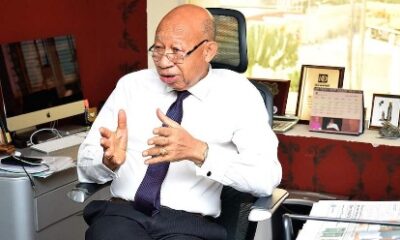

Pascal Dozie, Founder Of Diamond Bank Passes Away At 85


Tuface’s lover Natasha Osawaru replaced as Deputy Leader after shake-up in Edo Assembly


Nigeria seeks to host 2030 Commonwealth Games
Politics
Wike hosts suspended Rivers lawmakers in UK
Published
11 hours agoon
April 8, 2025By
Ekwutos Blog
The Minister of the Federal Capital Territory, FCT, Nyesom Wike, on Monday met with the suspended members of the Rivers State House of Assembly.
Wike hosted the suspended lawmakers for a dinner in the United Kingdom, UK.
This followed his earlier meeting with some of his political allies in Port Harcourt, the Rivers State capital, on Sunday.
The meeting was disclosed by the minister’s media aide, Lere Olayinka, via his Facebook page.
According to Olayinka: “Yesterday, the FCT Minister, Nyesom Wike, hosted Rivers State House of Assembly members who are in the United Kingdom for Legislative Capacity Building, to a dinner. Wike left Nigeria on Sunday night after visiting his political friends and associates in Port Harcourt, Rivers State.”
Recall that the lawmakers were suspended by President Bola Tinubu after declaring a state of emergency in Rivers State due to security concerns. Governor Sim Fubara was also suspended for six months. The emergency rule stemmed from the ongoing political crisis between Wike and Fubara.
The crisis had affected the lawmakers and the entire political structure in Rivers State.
The Supreme Court later intervened, ordering the reinstatement of the lawmakers and directing Governor Fubara to present the 2024 budget before the Martins Amaewhule-led Assembly.
However, Fubara’s attempt to present the budget was thwarted as the lawmakers barred him from accessing the Assembly complex.
The suspended lawmakers are currently in the UK for a legislative capacity-building programme.
Politics
Tuface’s lover Natasha Osawaru replaced as Deputy Leader after shake-up in Edo Assembly
Published
19 hours agoon
April 8, 2025By
Ekwutos Blog
Blessing Agbebaku and Maria Edeko on Monday retained their positions as the Speaker and the Deputy Speaker of the Edo State of Assembly after a minor leadership shuffle.
Ekwutosblog reports that the duo who are members of the Peoples Democratic Party, PDP, retained their positions following the implementation of a letter sent to the House by the state leadership of the All Progressives Congress, APC.
Agbebaku who read the letter addressed to him by the acting state chairman of APC, Jarret Tenebe, however, announced a minor change in the principal officers of the House.
Charity Aiguobarueghian, PDP, Ovia North-East I, Natasha Osawaru Irobosa, PDP, Egor, and Yekini Idaiye, PDP, Akoko-Edo I, were removed as the Majority Leader, Deputy Leader and Chief Whip of the House, respectively.
Natasha Osawuru is the lover of singer Tuface.
The trio were replaced with Ibhamawu Jonathan Aigbokhan, APC, Esan West as Majority Leader, Addeh Emakhu Isibor, APC, Esan North-East I, and Lecky Hussein Mustapha, APC, Etsako West I as Deputy Leader and Chief Whip of the House, respectively.
The position of the Deputy Chief Whip earlier given to Richard Edosa, Oredo West constituency, was eventually cancelled as there was no such position in the legislature.
The letter dated April 7, 2025, titled ‘Nomination of Principal Officers of the Edo State House of Assembly’, was signed by Tenebe, state acting chairman of APC and Lawrence Okah, the secretary.
Parts of the letter read: “We write to refer you to our earlier correspondence dated 14th March, 2025 to your office notifying you of the majority status of our party, the All Progressives Congress, APC, in the Edo State House of Assembly.
“Consequently, we hereby forward to you the party’s nomination of principal officers’ position in the House.
“Majority Leader, Hon Ibhamawu Jonathan Aigbokhan, Esan West constituency, Deputy Majority Leader, Hon Emakhu Addeh Isibor, Esan North-East I, and Chief Whip, Hon Lecky Hussein Mustapha, Etsako West constituency.”
The majority leader and deputy majority leader are from Edo Central Senatorial District while the Chief Whip, Lecky Hussein Mustapha, is from Edo North Senatorial District.
Recall that Richard Edosa was the only lawmaker elected on the platform of the Labour Party but he recently defected to the APC.
The Speaker, Agbebaku disclosed that the PDP would also bring its list of nominees of principal officers to the House.
He noted that his position as the Speaker and that of the Deputy Speaker were not guaranteed in the ongoing leadership change in the House.
Politics
NEC Meeting: No vacancy in LP leadership – Abure warns Peter Obi, Otti
Published
1 day agoon
April 7, 2025By
Ekwutos Blog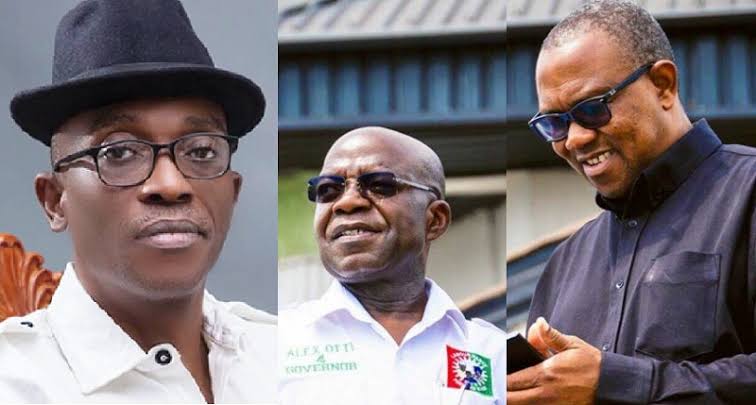
The National Chairman of the Labour Party, Julius Abure on Monday warned there is no vacuum in the party’s leadership.
Abure issued the warning ahead of the party’s National Executive Committee, NEC, meeting called by LP’s former presidential candidate, Peter Obi and Governor Alex Otti of Abia State.
Speaking at a public conference at the party secretariat, Abure described Obi and Otti as betrayals.
He noted that the Supreme Court was clear in its judgment, stressing that LP matters are internal affairs of political platforms.
According to Abure: “Tell them that there is no vacancy in our party. In the Labour Party, we don’t betray our candidates even though some betray us after giving them tickets.
“We also want to urge those who have been deceived by last week’s misleading interpretation of the Supreme Court judgment to disregard the speculation. I remain the National Chairman of the Labour Party.
“Again, the Labour Party Constitution does not recognise the setting up of a caretaker committee for party affairs.”
Ekwutosblog had reported that Obi and Otti had called for a NEC meeting scheduled to hold on Wednesday in Abuja.
The duo said the meeting would be followed by a town hall engagement with major stakeholders at the Transcorp Hilton in Abuja.

Champions League quarter-final: Arsenal thrash Real Madrid as Inter beat Bayern

US tariffs won’t have much effect on Nigeria – FG

Wike hosts suspended Rivers lawmakers in UK
Trending

 Trending6 months ago
Trending6 months agoNYA demands release of ‘abducted’ Imo chairman, preaches good governance
- Business6 months ago
US court acquits Air Peace boss, slams Mayfield $4000 fine

 Politics6 months ago
Politics6 months agoMexico’s new president causes concern just weeks before the US elections
- Entertainment6 months ago
Bobrisky transferred from Immigration to FCID, spends night behind bars
- Entertainment6 months ago
Bobrisky falls ill in police custody, rushed to hospital

 Politics6 months ago
Politics6 months agoRussia bans imports of agro-products from Kazakhstan after refusal to join BRICS

 Politics6 months ago
Politics6 months agoPutin invites 20 world leaders
- Politics1 year ago
Nigerian Senate passes Bill seeking the establishment of the South East Development Commission.

